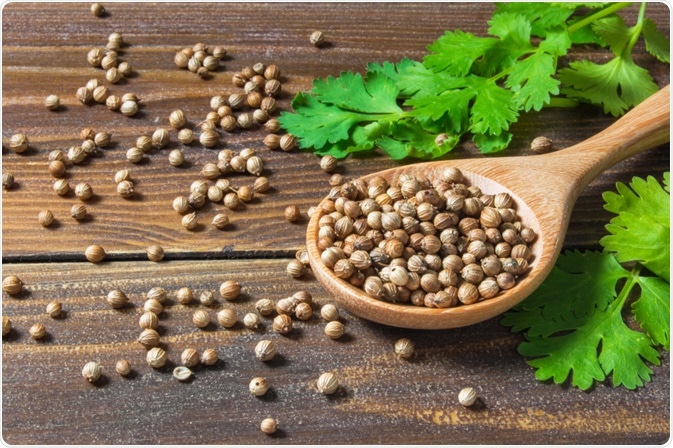Researchers have found that cilantro may provide health benefits in the form of reducing the risk of heart disease, diabetes, obesity, and seizure severity, as well as raising energy levels and healthy hair and skin.
 Image Credit: boommaval / Shutterstock.com
Image Credit: boommaval / Shutterstock.com
The Health Benefits of Cilantro
Cilantro, also known as coriander, is a herbal plant readily used in cooking and alternative medicine. Nutritionally, the herb is considered to be a good source of lipids and contains linalool, an essential oil. Furthermore, the herb has been used traditionally for its anti-epileptic, anti-depressant, and anti-inflammatory effects.
Research has found that cooking with cilantro can prevent the development of heterocyclic amines (HCAs) that arise when meat is cooked at high temperatures. High consumption of HCAs has been linked to an increased risk of cancer.
Anti-convulsant Properties
Contemporary studies have found that the consumption of cilantro may reduce the occurrence of epileptic seizures. Specifically, researchers report cilantro to be a highly potent activator of the voltage-gated potassium channel subfamily Q, referred to as the KCNQ channel. Dysfunction of the channel can cause brain damage, disease, or malfunction due to an epileptic seizure. This type of dysfunction does not typically respond to current anti-epileptic medication. It is thought that a component of cilantro, dodecanal, binds to the potassium channel causing them to open and reducing overall excitability of the neuron.
Antioxidant Effects
Cilantro is a member of the Umbelliferae plant family, which also includes carrots. Beta-carotene and lutein, which are found in cilantro and other Umbelliferae family members, are both carotenoids well known for their antioxidant characteristics. Antioxidants aim to reduce damage caused to cells by free radical released during oxidation.
Research has found that a positive relationship between antioxidant activity and the phenolic content of cilantro extracts. Additionally, the leaves of the herb offered greater antioxidant activity compared to the seeds. Based on this, increased dietary consumption of cilantro may act as a barrier against unwanted oxidation.
Similar research has found that carotenoids can reduce the likelihood of developing a range of conditions such as eye disease and specific cancers.
Mood Benefits
Due to the adverse side effects of benzodiazepines to manage anxiety, researchers have investigated the anxiolytic effects of coriander seed extract in mice. In one study, the extract’s ability to reduce anxiety was comparable to that of prescription medication. The extract also produced muscle relaxant and sedative effects.
Management of Diabetes
Many consider the use of herbs such as cilantro to be beneficial in managing conditions such as diabetes. There is a growing body of preclinical literature that supports these claims. Research examining such effects in diabetic mice has found that those given diets or water extracts of the cilantro seed showed reduced levels of hyperglycemia. However, the studies failed to find a reduction in excessive thirst – a common symptom of diabetes – as a result of the herb treatment.
Anti-inflammatory Properties
Literature suggests that cilantro has anti-inflammatory and analgesic effects. Cilantro, as an anti-inflammatory agent, has been observed in the production of the Sri Lankan Maharasnadhi Quather (MRQ). MRQ contains cilantro seed as its primary component and is reported to boast anti-inflammatory and analgesic properties in human and animal research.
Specifically, the consumption of MRQ in rats has been found to increase their pain threshold by over 50%. In human studies, the prescription of MRQ in those with rheumatoid arthritis has been shown to reduce inflammation and pain, improve mobility in the absence of adverse implications on the gastrointestinal and liver functions.
Nutritional Benefits
Fresh coriander leaves contain approximately, 6% carbohydrates 3% protein, trace levels of iron, vitamin C, vitamin B2 and vitamin A. A quarter of a cup of the herb contains 5% of the recommended daily amount of vitamin A and 2% of the recommended daily amount of vitamin C.
Antimicrobial Properties
Animal studies investigating the health benefits of cilantro have found the herb to have antimicrobial properties. In one study, chicks were given either a water-based cilantro extract or cilantro seed powder varying in concentrations. When compared to the control group, those that consumed the aqueous extract and 1.5% and 2% of the powder showed substantially reduced Escherichia coli in the ileal (small intestinal) microflora.
Complementary research has shown that the use of a coriander-derived essential oil to treat thrush was successful.
Sources
- Sahib, N. G., Anwar, F., Gilani, A. H., Hamid, A. A., Saari, N., & Alkharfy, K. M. (2013). Coriander (Coriandrum sativium L): a potential source of high-value components for function foods and nutraceuticals – a review. Phytotherapy Research. DOI: 10.1002/ptr.4897
- Singletary, K. (2016). Coriander: Overview of Potential Health Benefits. Nutrition Today. DOI: 10.1097/NT.0000000000000159
- Manville, R. W., & Abbott, G. W. (2019). Cilantro leaf harbors a potent potassium channel-activating anti-convulsant. FASEB. DOI: 10.1096/fj.201900485R
- Davar, V., Rathi, S., & Dua, A. (2012). Antioxidant Properties of Coriandrum Sativum (Coriander). FASEB. DOI: 10.1096/fasebj.26.1_supplement.823.14
- Wangensteen, H., Samuelsen, A. B., & Malterud, K. E. (2004). Antioxidant activity in extracts from coriander. Food Chemistry. DOI: 10.1016/j.foodchem.2004.01.047
- https://www.ncbi.nlm.nih.gov/pmc/articles/PMC5607387/
Further Reading
Last Updated: Nov 26, 2019